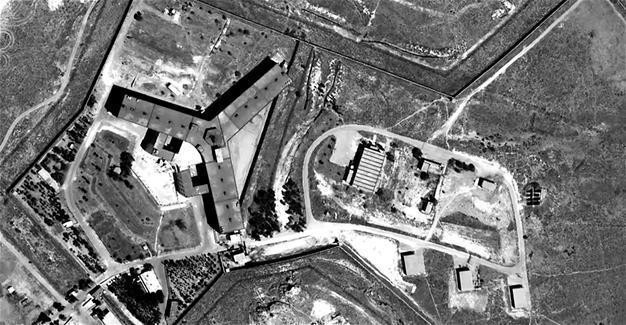Syria regime hanged 13,000 in notorious prison, Amnesty International says
BEIRUT

As many as 13,000 people were hanged in five years at a notorious Syrian government prison near Damascus, Amnesty International said on Feb. 7, accusing the regime of a “policy of extermination.”
Titled “Human Slaughterhouse: Mass hanging and extermination at Saydnaya prison,” Amnesty’s damning report is based on interviews with 84 witnesses, including guards, detainees, and judges, AFP reported.
It found that at least once a week between 2011 and 2015, groups of up to 50 people were taken out of their prison cells for arbitrary trials, beaten, then hanged “in the middle of the night and in total secrecy.”
“Throughout this process, they remain blindfolded. They do not know when or how they will die until the noose was placed around their necks,” the rights group wrote.
Most of the victims were civilians believed to be opposed to the government of President Bashar al-Assad.
“They kept them [hanging] there for 10 to 15 minutes,” a former judge who witnessed the executions said.
“For the young ones, their weight wouldn’t kill them. The officers’ assistants would pull them down and break their necks,” he said.
Amnesty said the practices amounted to war crimes and crimes against humanity, but were likely still taking place.
Thousands of prisoners are held in the military-run Saydnaya prison, one of the country’s largest detention centers located 30 kilometers (18 miles) north of Damascus.
Amnesty accused the Syrian government of carrying out a “policy of extermination” there by repeatedly torturing detainees and withholding food, water, and medical care.
Prisoners were raped or forced to rape each other, and guards would feed detainees by tossing meals onto the cell floor, which was often covered in dirt and blood.
The group has previously said that more than 17,700 people were estimated to have died in government custody across Syria since the country’s conflict erupted in March 2011.
The figure of 13,000 deaths in a single prison, therefore, is a marked increase.
Next Astana meeting likely in mid-February, says Russia This report came one day after experts from Russia, Turkey, Iran and the United Nations held a technical meeting in the Kazakh capital of Astana on Feb. 6 to discuss the implementation of the Syrian cease-fire agreement, Kazakhstan’s Foreign Ministry said.
The sides signed no documents at the meeting, but Russia’s TASS and Interfax news agencies quoted a Russian negotiator as saying they would meet again this month and might sign an agreement regulating the work of a joint task force.
After the talks, Russian negotiator and senior military official Stanislav Gadzhimagomedov said the sides had discussed how to avoid provocations and secure humanitarian access.
“The delegations have confirmed their readiness to continue interaction in order to achieve the full implementation of the cessation of hostilities in Syria,” Reuters quoted him as saying.
Gadzhimagomedov told TASS the sides could meet again on Feb. 15-16, according to Reuters.
Meanwhile, at least 21 Islamic State of Iraq and the Levant (ISIL) militants were “neutralized” in northern Syria in the last 24 hours as part of the ongoing Euphrates Shield operation, according to a Turkish General Staff statement released early on Feb. 7.
Authorities often use the word “neutralized” in their statements to imply the militant in question was either killed or captured.
In addition, 203 ISIL targets, including the jihadist group’s shelters, headquarters, defense positions and vehicles had been hit by Free Syrian Army (FSA) fighters with Turkish army’s support, the statement said.
The Turkish army is supporting FSA fighters in taking over al-Bab, a strategic city for ISIL, from the jihadist group. Feb. 7 marks the 168th day since the city was surrounded in order to liberate it.
The Turkey-led Euphrates Shield operation began in late August to improve security, support coalition forces, and eliminate the terror threat along the Turkish border using FSA fighters backed by Turkish artillery and jets.
 As many as 13,000 people were hanged in five years at a notorious Syrian government prison near Damascus, Amnesty International said on Feb. 7, accusing the regime of a “policy of extermination.”
As many as 13,000 people were hanged in five years at a notorious Syrian government prison near Damascus, Amnesty International said on Feb. 7, accusing the regime of a “policy of extermination.”